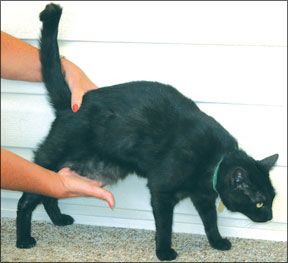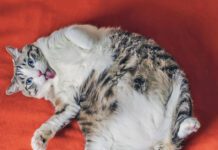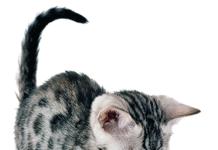You merely open your eyes in the morning – and your cat sprints to the kitchen. You head for the refrigerator and trip over the cat, who is winding around your legs, begging for food. Is the food gone as soon as it hits the bowl? Worse yet, does your cat wake you up in the middle of the night to be fed? Theres always a reason for excessive hunger in cats. Sometimes it signals underlying illness; sometimes its a matter of conditioning or boredom. Heres what you need to know about your ravenous cat. Bev Caldwell 288 It seems obvious to say that a cat that is overweight is eating too much. “But it all depends on the cat,” says Kathryn E. Michel, DVM, an associate professor of nutrition at the University of Pennsylvania. “Some cats can choice-feed. If you leave out food, theyll eat what they want and maintain a good weight. Other cats will eat everything you put out for them and then look for more.” How to Assess Your Cat’s Condition How much should your cat weigh? The optimum weight varies from one breed to another. A Maine coon is a big cat and should certainly weigh more than a lithe Siamese. “Today we concentrate more on body condition instead of weight,” says Dr. Michel. This is how you and your veterinarian can assess your cats body condition, says Dr. Michel. First, feel your cats ribs behind his shoulder blades and run your fingers lightly over his sides and chest. You should feel your fingers slightly fall in the gaps between the ribs. To get a feel for this, slide your fingers across the metacarpal bones on the back of your other hand. “Your cats ribs should feel the same way,” says Dr. Michel. Now, make a fist with your right hand. Slide the fingers of your left hand over the knuckles of your other hand. “If your cats ribs feel like this – too prominent – then your cat is too thin and may be losing weight even if hes eating a lot.” Finally, turn one hand over and rub the fingers of the other hand over the heel of the hand (under the thumb). If your cats chest feels like this – with no ribs at all – then your cat is too fat, says Dr. Michel. “This is the same conditioning test we do with dogs,” says Dr. Michel. “But with cats, we also need to feel for the abdominal fat pad.” Cats will often carry weight in the abdomen even if their ribs feel okay. “If your cat carries a pouch which almost drags across the floor, thats extra fat,” says Dr. Michel, “not extra skin or fur” (unless your cat has loose skin after losing a lot of weight). So feel your cats lower abdomen; you shouldnt feel a pouch with fat in it. The abdomen should feel taut. “Do 
Check your cats conditioning once a month, says Dr. Michel. Weight can creep up over time, so if you catch it early, you can take steps to reduce it early. Heres a fact that may surprise you: “If your cat eats just ten calories more a day than she needs – thats a teaspoon of dry cat food – your cat will gain a pound of body fat by the end of one year,” says Dr. Michel.
Overeating as a Sign of Illness
If your cat seems extremely hungry and is gaining weight – or losing weight – see your veterinarian,” says Dr. Michel. Your veterinarian will determine whether the increased appetite (
polyphagia) indicates an underlying disease. Here are the most common medical conditions that can cause increase your cats appetite.Hyperthyroidism:
Cats with an overactive thyroid gland (which controls metabolism) are hungry all the time, but dont gain weight. (They can, in fact, be very thin.) Other symptoms include agitation and reduced need for sleep. Treatment includes medication and sometimes radioactive iodine, which destroys abnormal thyroid tissue while keeping the gland intact.Parasites:
Roundworms and other parasites in your cats intestinal tract compete with the body for food. Your cat will act very hungry, but look underweight and be malnourished. Medication helps to rid your cat of the parasite, and also prevents future infestation.Diabetes:
This serious hormonal disease can make your pet hungrier and thirstier than usual. But diabetes can also be a consequence of being obese. “Cats that are overweight are four times as likely to develop diabetes,” says Dr. Michel. Treatment includes glucose regulation and controlled weight loss.Steroids:
Pets that take steroids for treatment of allergic skin diseases or injuries will sometimes eat everything in sight. If your cat is put on steroids, be prepared for an increase in appetite and start controlling your cats food portions right away.Behavioral Reasons for Overeating
There are a number of reasons why your cat might overeat out of habit. The instinct to gorge oneself with food seems to be more prevalent in cats that have been strays or that have been deprived of food in their early years. “I know someone who adopted lots of tomcats,” says Dr. Michel. “She has to keep food locked up – or her cats will break into the pantry to eat cookies.”
Overeating tends to be more of a problem when there is more than one pet in the family. In a multi-cat family, cats sometimes gobble as much as they can when they’re fed out of fear that someone else will get their food if they don’t.
As with humans, some cats will overeat when theyre bored, especially if theyre left alone all day at home. If you think this might be the case with your cat, leave some fun toys around the house, says Dr. Michel. “Try ‘feeding enrichment’ strategies
that make your cat work for his meals.” These include food puzzles and other products, such as the Buster Cube, available through your pet supply shop.The most common reason why cats overeat may be the behavior of their human companions. “Giving food is a huge part of bonding and affection in our society,” says Dr. Michel. “So its natural that we do it with our pets. But many times our pets are asking for attention – not food. There are other ways to show our felines we love them; playing with them is an important one.”
In rare cases, pets will eat and eat because they are emotionally incapable of stopping, a condition called obsessive-compulsive disorder – very similar to the mental disorder that is suffered by humans. If all else is ruled out, consult with a veterinary behaviorist to see if medications will help your cat control his urge to eat.



